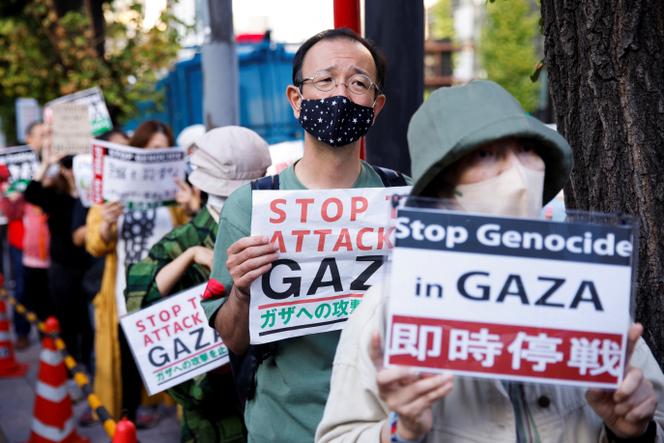

LETTER FROM TOKYO

The Japanese government maintains a certain neutrality in the conflict between Israel and Hamas. It condemns terrorism and advocates for humanitarian pauses. Public opinion, however, seems to be more divided, reflecting Japan's unique relationship with Judaism.
On Friday, November 24, around 30 people, including representatives of the far-left teachers' union Zenkyo, gathered outside the Israeli embassy to call for "saving Gaza" and "stopping the bombing." Their banners also carried more controversial slogans such as "Stop the genocide in Gaza," or "From the river to the sea, Palestine will be free," the latter often interpreted as a call to destroy Israel.
The rallies organized since the Hamas attack on October 7 have mainly been in support of the Gaza Strip. Those supporting Israel are rarer.
Although generally peaceful, these gatherings do not rule out clashes like the one on November 16, when a far-right activist, Shinobu Sekiguchi, a member of the Seidokai Gijuku – traditionally hostile to the far left, and therefore to pro-Gaza movements – drove his car into a protective barrier in front of the Israeli embassy, injuring a policeman. The Israeli ambassador said he was "shocked."
Such incidents are rare in Japan. Within the local Jewish community, the recommendation is to remain "vigilant," explained one of its members. Anti-Semitic acts "have increased since October 7, but not dramatically." This indicates that the archipelago is not immune to anti-Semitism, which may be surprising given the recent presence of the Jewish community and its small size (only a few hundred people).
The first contact between the Japanese and Judaism dates back to the arrival of Portuguese missionaries in the archipelago in the 16th century. The first Jews to come to Japan arrived after the country opened up to foreign trade in 1854. They were Alexander Marks and his brother, who settled in Yokohama in 1861. Then came American businessman Raphael Schover, who launched the Japan Express, the country's first foreign-language newspaper.
The rapid development of the archipelago during the Meiji period (1868-1912) led European authors such as the Scottish missionary Nicholas McLeod (1868-1889) and the German anthropologist Albrecht Wirth (1866-1936) to establish a link between the 10 Lost Tribes of Israel and the Japanese. This theory was intended to explain Japan's rapid modernization compared with other Asian countries. It was "the expression of an early tendency to grant the Japanese the status of 'honorary whites' and separate them, at least in Western public representations, from the 'Mongoloid yellow masses,'" wrote Rotem Kowner of the University of Haifa in 2000, in "Lighter than Yellow, but not Enough: Western Discourse on the Japanese 'Race,' 1854 - 1904" (The Historical Journal, Cambridge University Press, 2000).
You have 50% of this article left to read. The rest is for subscribers only.
